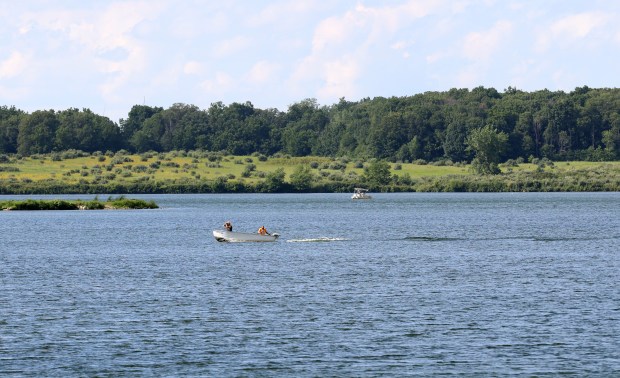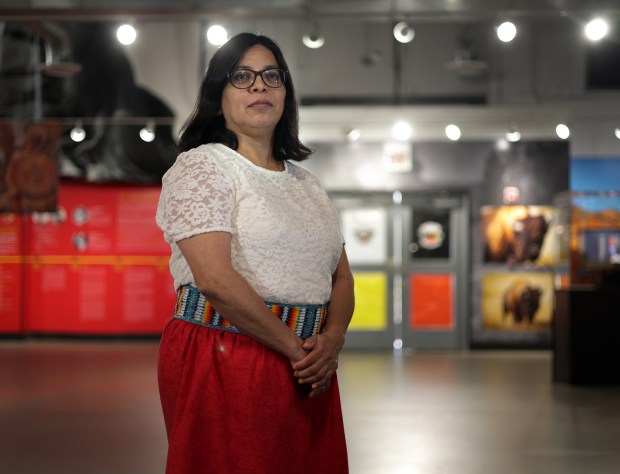When Potawatomi Chief Shab-eh-nay left his home in present-day DeKalb County to visit family in Kansas, he returned just weeks later to seized lands. The U.S. government had illegally auctioned off the 1,280-acre reservation.
“They said he abandoned his land and sold it,” said Joseph Rupnick, the chairman of Prairie Band Potawatomi Nation.
The generational trauma of the past 175 years weighed heavily on Rupnick, Shab-eh-nay’s fourth great-grandson. And it remained at the forefront of his mind April 19 when he signed a deed placing 130 acres of that land in trust — a bureaucratic process that grants Prairie Band sovereignty in the territory.
It means for the first time in nearly two centuries, Illinois is home to a federally recognized tribal nation.
“All those years of fighting, and trying to get folks to see the injustice that was done, actually is starting to make change,” Rupnick said. “It’s kind of surreal.”
The designation marks a long-awaited victory in the tribal nation’s fight to recover its ancestral home. When the land is placed in trust, the legal title is transferred to the U.S. government, which will hold it on behalf of Prairie Band and establish tribal governance. It opens up a string of benefits including tax credits and land use exemptions.
Prairie Band first purchased a piece of the acreage in the small village of Shabbona in 2004 and another swath of farmland two years later. Proposed legislation at the state and federal levels would allow the newly established reservation to expand further.
“This is a chance for us to right that historical wrong,” Rupnick said. “We know that this fight was not in vain.”
Millions of Indigenous people once lived in the Midwest. But as settlers began to expand west, tribes were forced to relinquish their lands, often through arbitrary treaties. An 1829 treaty had protected the land in DeKalb County for Shab-eh-nay and Prairie Band before its seizure decades later.
The Indian Removal Act in 1830 eventually drove all tribes in the region west of the Mississippi, including the Potawatomi. Prairie Band purchased a reservation in Kansas, where most of its 5,000 citizens still live today.
“Because of the intentional invisibility and erasure within this country of Indigenous people, it’s like you have to teach people that we still exist,” said Jasmine Gurneau, the board president of the Chicago American Indian Community Collaborative.
The recent land transfer was made possible by a 2020 U.S. Supreme Court case, McGirt v. Oklahoma. The court determined that tribal nations still have sovereignty over historic reservations if they were never formally disestablished by Congress. It allowed Prairie Band to apply for trust status within the grounds of the former Shab-eh-nay Reservation, according to Rupnick.
Usage for the reservation has yet to be determined. A spokesperson for the Bureau of Indian Affairs confirmed the land transfer in a statement.
“It is the Department’s policy to acquire land in trust for Tribes to strengthen self-determination and sovereignty, and to ensure that every Tribe has protected homelands where its citizens can maintain their Tribal existence and way of life,” the statement said.
For Gina Roxas, the designation is long overdue. The Prairie Band citizen grew up on the South Side of Chicago hearing stories of the tribal nation’s ancestral home. She had assumed little would change in her lifetime.
“I was taught we were all descendants of Chief Shab-eh-nay, and so it is our birthright to this land and it is up to us to ensure the well-being of the land,” said Roxas, the executive director of Trickster Cultural Center in Schaumburg, an intertribal cultural arts nonprofit.
Roxas’s grandmother was raised on the Kansas reservation. She spent most of her life working as an archivist, collecting oral migration stories and historic photographs in hopes that they could be used to support the reacquisition of Illinois land. Other Prairie Band citizens would travel to Springfield to lobby lawmakers.
“Although tribal government was integral in bringing this forward, it was community-driven,” Roxas said. “(My grandmother) would cry tears of joy. She would be so happy that this is going on.”
The impact will resonate far beyond Prairie Band – it’s a milestone for all Indigenous peoples in the state, Gurneau said.
“It puts Indigenous peoples on the map in Illinois,” said Gurneau, a citizen of the Oneida Nation and a descendant of the Menominee. “It was just really, really beautiful to be able to witness that in my lifetime when I don’t think I would have thought that could happen.”
Prairie Band’s footprint may continue to grow. Federal legislation proposed last year would grant the tribal nation cash settlements so it can buy back more land in the area.

At the state level, a bill would immediately turn over Shabbona Lake State Park, around 1,500 acres adjacent to the reservation. If passed, Prairie Band would assume ownership but continue to operate the property as a public space. The bill is still in committee, but Rep. Mark Walker, a Democrat from the Northwest suburbs and one of the co-sponsors, is optimistic that it will go forward.
“It was an unfair taking of land that we had given to this band, primarily because, in their negotiations with us, they supported the local settlers,” Walker said. “It’s really remarkable that this is the group that we then turn around and steal the land from.”
Lawmakers’ efforts have left Rupnick with a lingering sense of hope. It seems a decadeslong quest for recognition is at last making ground.
“I know that a lot of the pushback was, ‘Well, there’s no reservation there in Illinois, there will never be any reservation,’” he said. “Attitudes have changed. Folks are more receptive to correcting historical wrongs than they were in the past.”



